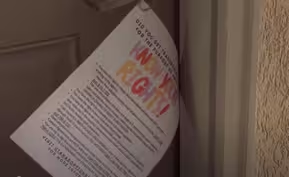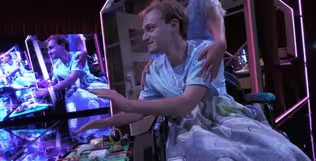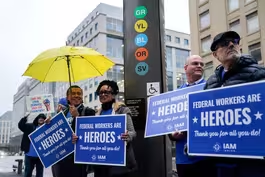
Measles cases surge to highest levels in over 30 years
Clip: 7/10/2025 | 5m 39sVideo has Closed Captions
Measles cases surge to highest levels in over 30 years, CDC data shows
CDC data shows 2025 is now the worst year for measles cases in this country in more than three decades. More than 150 people have been hospitalized due to the growing outbreak and three have died, including two unvaccinated children in Texas. Amna Nawaz discussed more with Dr. Adam Ratner, author of Booster Shots: The Urgent Lessons of Measles and the Uncertain Future of Children's Health."
Problems playing video? | Closed Captioning Feedback
Problems playing video? | Closed Captioning Feedback
Major corporate funding for the PBS News Hour is provided by BDO, BNSF, Consumer Cellular, American Cruise Lines, and Raymond James. Funding for the PBS NewsHour Weekend is provided by...

Measles cases surge to highest levels in over 30 years
Clip: 7/10/2025 | 5m 39sVideo has Closed Captions
CDC data shows 2025 is now the worst year for measles cases in this country in more than three decades. More than 150 people have been hospitalized due to the growing outbreak and three have died, including two unvaccinated children in Texas. Amna Nawaz discussed more with Dr. Adam Ratner, author of Booster Shots: The Urgent Lessons of Measles and the Uncertain Future of Children's Health."
Problems playing video? | Closed Captioning Feedback
How to Watch PBS News Hour
PBS News Hour is available to stream on pbs.org and the free PBS App, available on iPhone, Apple TV, Android TV, Android smartphones, Amazon Fire TV, Amazon Fire Tablet, Roku, Samsung Smart TV, and Vizio.
Providing Support for PBS.org
Learn Moreabout PBS online sponsorshipAMNA NAWAZ: 2025 is now the worst year for measles cases in this country in more than three decades.
That's according to new data from the Centers for Disease Control and Prevention.
More than 150 people have been hospitalized due to the growing outbreak, and three have died, including two unvaccinated children in Texas.
To help us break down the new data, we're joined now by Dr. Adam Ratner.
He's a member of the Committee on Infectious Diseases of the American Academy of Pediatrics and the author of "Booster Shots: The Urgent Lessons of Measles and the Uncertain Future of Children's Health."
Dr. Ratner, thanks for joining us.
When we say it's the worst year in all those years, here's a quick look at the numbers.
The national case count reached 1,288 on Wednesday.
That is across 38 states.
There have been 162 hospitalizations.
About half of those are children under the age of 5.
Doctor, put that into context for us.
How do these numbers compare to years past?
DR. ADAM RATNER, American Academy of Pediatrics: Right.
So this is the largest number of cases in more than 30 years.
It goes back to before we had eliminated measles from the United States, which happened in the year 2000.
In the late 1980s and early 1990s, we had large outbreaks in a number of cities.
And that's when we had these really high case counts.
And we're rivaling those numbers now.
So this is a really disappointing milestone we have hit.
AMNA NAWAZ: And the year is only half over at this point.
Do you expect this trend to continue?
DR. ADAM RATNER: I mean, I think that the case numbers this year have really been driven by the outbreak in West Texas and New Mexico.
That appears to be slowing down.
But I think it's alarming that we have measles in many states now.
And I'm concerned that there will be other unvaccinated communities where measles gets in and starts to spread.
AMNA NAWAZ: You mentioned the number of active outbreaks in states, but the largest outbreak, as you pointed out, starting a few months ago in an undervaccinated community in West Texas.
You described outbreaks like that as the canary in the coal mine.
Why?
DR. ADAM RATNER: Because measles is our most contagious disease.
It is more contagious than flu or COVID or polio or Ebola or anything else that you can think of.
And so, when we start to see vaccination rates drop, when we start to see local public health departments struggle to maintain funding and personnel, the first thing that we see are measles outbreaks.
Measles outbreaks are important, in and of themselves, as we have seen in West Texas this year.
We have had a couple of children die there.
They can be very serious.
But it's also a warning sign that other things are coming.
And we're already starting to see some of these other vaccine-preventable diseases like whooping cough coming back this year as well.
AMNA NAWAZ: What role do medical and religious exemptions play in all of this?
And how do you look at that balance between public health and personal freedom?
DR. ADAM RATNER: Right.
So vaccine mandates, meaning school-based vaccine requirements, were an integral part of getting to measles elimination.
And I think that, without those sorts of mandates, we don't get to the levels of vaccination that we need to control a disease as contagious as measles.
There will always be, there have to be medical exemptions to vaccine mandates for the very rare children that have an allergy to something that's in one of the vaccines.
Clearly, you don't require that child to get that vaccine.
But it's the non-medical exemptions that have grown over the last decade or so and that really put some of these communities at much higher risk.
AMNA NAWAZ: This is all, of course, happening in the context of Health and Human Services Secretary Robert F. Kennedy Jr. last month firing all 17 members of the CDC's vaccine advisory committee.
He replaced them with his own choices.
Kennedy, of course, as we know has expressed anti-vaccine views in the past.
But he argues, Dr. Ratner, that this will help to restore public trust in vaccines.
How do you look at these changes?
DR. ADAM RATNER: I think that these changes are alarming and that this is the least qualified and least transparent Advisory Committee on Immunization Practices that we have ever seen.
It's -- the meeting that happened last month of that committee was alarming, because they talked about revisiting the entire vaccine schedule.
There were presentations from anti-vaccine groups.
And I think that we're in a very dangerous place with measles and other vaccine-preventable diseases spreading and with the HHS secretary and now the ACIP seemingly working against vaccination.
AMNA NAWAZ: Dr. Adam Ratner, a member of the Committee on Infectious Diseases at the American Academy of Pediatrics, thank you so much for your time.
We appreciate it.
DR. ADAM RATNER: My pleasure.
Thank you.
Agencies accused of rushing adoptions before moms backed out
Video has Closed Captions
Clip: 7/10/2025 | 8m 55s | Agencies accused of rushing adoptions before mothers can change their minds (8m 55s)
Jan. 6 prosecutor says pardons send 'dangerous message'
Video has Closed Captions
Clip: 7/10/2025 | 7m 42s | LAW & JUSTICE (7m 42s)
News Wrap: Judge blocks order to end birthright citizenship
Video has Closed Captions
Clip: 7/10/2025 | 7m 10s | News Wrap: Federal judge blocks Trump order to end birthright citizenship (7m 10s)
Opera uses AI to give non-verbal people a voice
Video has Closed Captions
Clip: 7/10/2025 | 9m 20s | Opera uses AI to give people with non-verbal disabilities a voice (9m 20s)
Union says fight continues against federal employee firings
Video has Closed Captions
Clip: 7/10/2025 | 7m 1s | Federal workers union says it will continue to fight firings after Supreme Court ruling (7m 1s)
Why plans for a warning system fell apart in Kerr County
Video has Closed Captions
Clip: 7/10/2025 | 6m 12s | Plans for a flood warning system fell apart in Kerr County, leaving it vulnerable (6m 12s)
Providing Support for PBS.org
Learn Moreabout PBS online sponsorshipSupport for PBS provided by:
Major corporate funding for the PBS News Hour is provided by BDO, BNSF, Consumer Cellular, American Cruise Lines, and Raymond James. Funding for the PBS NewsHour Weekend is provided by...

















